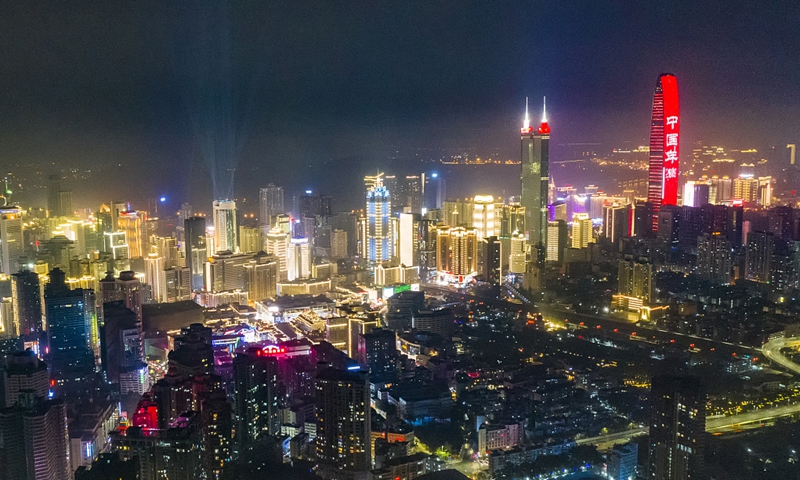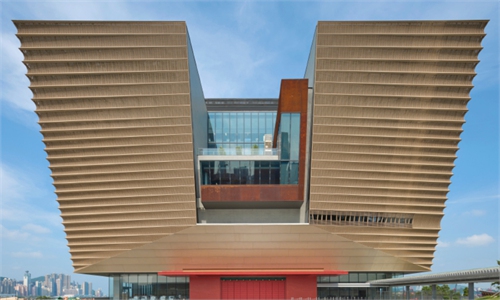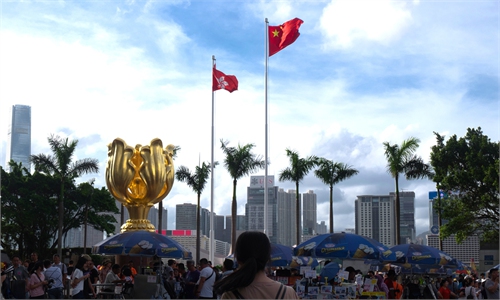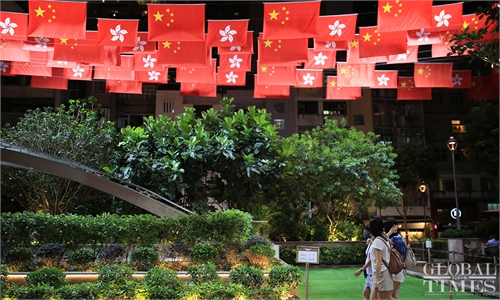HK university’s new campus in mainland to boost synergy in education, national identity among youth

Guangdong-HongKong-Macao Greater Bay Area Photo: VCG
The Hong Kong University of Science and Technology (HKUST) will open a new campus in Guangzhou, South China's Guangdong Province, which has recently gained approval from the Ministry of Education (MOE). The move is expected to better integrate quality educational resources of the Hong Kong Special Administrative Region and the Chinese mainland, ahead of the 25th anniversary of Hong Kong's return to the motherland.Observers believe the synergy in education will not only cultivate more high-end talent for the mainland but will also help Hong Kong transform and apply its advanced research capacity across more industries. The exchanges will also boost national identity recognition for youth in Hong Kong.
The new Guangzhou campus, co-founded by HKUST and the Guangzhou University, will begin its first semester on September 1. It is located in Nansha, south of Guangzhou, and is adjacent to the Qingsheng station on the high-speed Guangzhou-Shenzhen-Hong Kong Express Rail Link. It takes just 30 minutes to travel there from the Hong Kong West Kowloon railway station, making collaboration between the two campuses very convenient, the Global Times learned from the University's official website on Wednesday.
The university integrates high-quality educational resources from both Hong Kong and the mainland and will aim at cultivating innovative talents with a global vision. It will promote the reform of higher education in China, facilitate the integrated development of education between Hong Kong and the mainland, and serve the construction of the Guangdong-Hong Kong-Macao Greater Bay Area.
The State Council recently issued a plan to promote comprehensive cooperation between Guangdong, Hong Kong and Macao by further deepening the opening-up of Nansha, and education is among the key topics of building it into a world-class strategic platform for better integration.
Lawrence Tang Fei, a member of the Chinese Association of Hong Kong and Macao Studies, told the Global Times on Wednesday that Hong Kong and the mainland will supplement each other in a number of ways. For one thing, the advantageous educational resources in Hong Kong will be allocated to more mainland students after the new campus is set up, breaking the previous limitation that some 80 percent of student enrollment must be local Hong Kong residents.
Hong Kong currently has six universities ranked in the top 500 in the world, four of which rank within the top 100.
For another thing, Hong Kong has access with other globally advanced institutions in carrying out scientific research, be it technology exchanges or intellectual property rights exchanges. The mainland, however, cannot always gain such access easily as it faces a complex environment, for example, some countries would enforce technological blockade on the Chinese mainland, especially in high-tech fields.
The mainland, in return, can help apply the advanced research results to industries and businesses, as Hong Kong lacks the room and enterprises for such transformation while Guangdong has a well developed manufacturing industry, providing the soil for the transformation of scientific research results.
In a statement Hong Kong's Innovation and Technology Bureau sent to the Global Times, it said that "We can pool together innovation resources across the Greater Bay Area and the globe, and provide the mainland with services such as research and development, intellectual property trading, financing and mediation. On the other hand, our country has always been the strongest and most solid backing for Hong Kong, and the development of Hong Kong is inseparable from the country."
The HKUST Guangzhou campus for now offers three undergraduate programs, namely artificial intelligence, big data technology, and intelligent manufacturing engineering. Another 15 master and doctoral programs are offered, including advanced materials, intelligent transportation and microelectronics.
It is the third cooperative university between Hong Kong and the mainland that has been approved by the MOE, following the Beijing Normal University-Hong Kong Baptist University United International College established in 2005 and the Chinese University of Hong Kong (Shenzhen) in 2014.
Another cooperative program, the City University of Hong Kong (Dongguan), is also being set up and will be submitted to the MOE once the preparation works are finished.
The landscape in today's Hong Kong campuses is in sharp contrast with that of 2019. Looking back at the social turmoil at that time, teenagers were the most fanatical group. They set fires, smashed stores, destroyed public facilities, threw petrol bombs, and attacked police. Data showed that students accounted for 40 percent of the 7,700 people who were arrested for participating in the riots as of March 2019, and more than half of them were university students, Xinhua reported.
In light of these changes, experts noted that such coordination in education will have greater synergy in cultivating more high-end talent, but also boost patriotism and national identity for Hong Kong's youth by creating a sense of belonging in the frequent personnel exchanges with the mainland.





